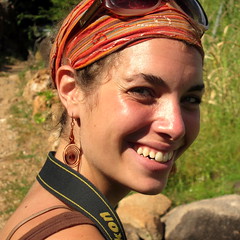In Malawi, however, I have found myself entertaining all variety of new labels and names. Mzungu/azungu (white person, less respectfully/more respectfully) tops the chart, but the name-calling doesn’t stop there. I’m also mama, mami, sister, baby, friend, girlfriend, customer, you, and all of these in Chichewa. Hardly noteworthy — every foreign young woman receives this kind of attention. But sometimes locals know my real name, and I’m always pleased with their variations. Malawians tend to spell my name “Rabecca” (my bank card even identifies me this way — every time I slide it into an ATM, the screen shouts “GOOD AFTERNOON RABECCA!”), and the confusion over L and R in Chichewa means I’m sometimes called “Labecca.” In Ndirande, the township where I’m doing my research, I often buy samosas from a young boy who calls me “Rabe” (no, not pronounced like the bitter broccoli leaf). And when I visit Mrs. Mkutu’s house, she places her two-month old grandson in my arms and announces the arrival of “Auntie Rebecca.”
But my two favorite soubriquets have nothing to do with my given name. The first is “azungu dala,” a name I’ve heard only twice but would continue to welcome. I was in Ndirande the first time, trudging up a dusty hill with a Malawian friend. She gently punched my shoulder, laughing and repeating the name to herself, “azungu dala, azungu dala.” I asked her to explain. “It’s like a white person, but a white person who —” she paused. “It’s like ‘mwana dala,’ someone who looks like a child but isn’t a child.” I considered this. “So I look like a white person, but I’m not one?” I asked. She wasn’t entirely sure how to answer. But I heard the same name later that week, this time while disembarking from a minibus. I’ve decided to take it as a compliment — I may look like a white person, sure, but I also take local transport and spend my time in gritty urban townships, and maybe that makes me something else.
The second moniker has even more curious origins, and may not even qualify as a nickname, but let’s run with it, ok? Several weeks ago, I tromped to the market to buy a table and chairs for my house. Lacking transport, I hired two men to carry the furniture home for me. We cut quite the spectacle — me in front, chomping on groundnuts, and the men behind, balancing heavy wooden furniture on their sweaty bald heads. As we made the last turn to my house, I greeted the cluster of women and children who gather there to sell sugarcane and fried balls of dough and cell phone credit. They looked at us with surprise and confusion. “Ndilibe galimoto!” I called — “I don’t have a car!” They hooted with laughter, and we continued on our way.
Several days later, I rounded that same corner, this time alone. I smiled and waved at an adolescent girl. “Ndilibe galimoto!” she called, then pointed at me and ran in the opposite direction. I shrugged. It’ll do.




No comments:
Post a Comment